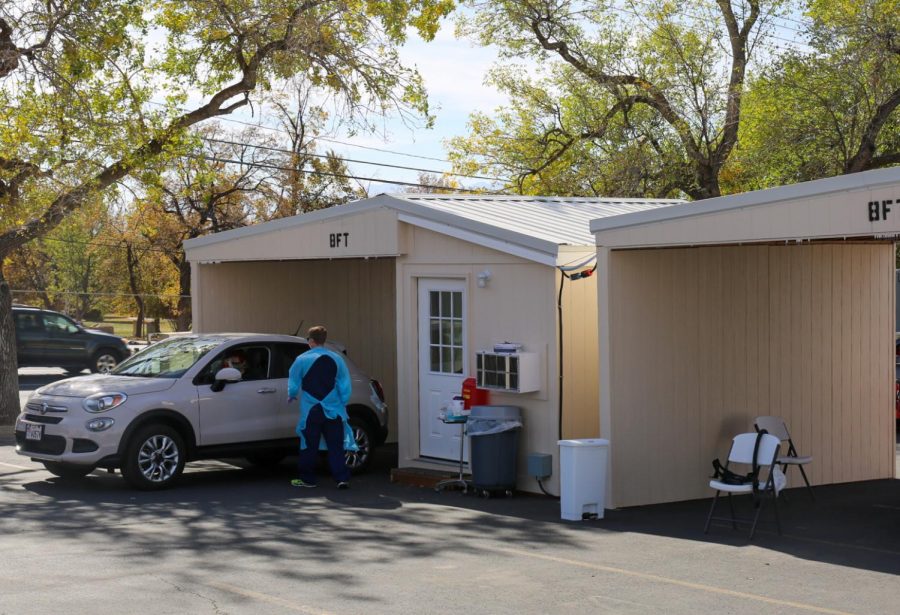Pre-Thanksgiving Testing at the U Sets Precedent for Spring
People get tested at the Rice Eccles COVID-19 testing station in University of Utah in Salt Lake City. (Photo by Tom Denton | Daily Utah Chronicle)
November 11, 2020
In the wake of Utah Gov. Gary Herbert’s announcement of a state of emergency on Nov. 8, the University of Utah issued its new testing plan for the remainder of the Fall 2020 semester before Thanksgiving.
“We are concerned about the possibility that students may be asymptomatic and unintentionally expose their families to coronavirus as they return home,” the plan reads.
“We strongly encourage all students to sign up for a free test. Our approach is aligned with actions of other higher education institutions throughout Utah.”
A link will be sent out to students on Nov. 11 asking them to sign up for a time slot to be tested between Nov. 11-23.
The test will be a self-swab of a nostril, which will then be placed on a card that will indicate a positive or negative result.
“If your test is provisionally positive, you will be asked to return to the testing site to take a saliva test to confirm the result and then to self-isolate while awaiting confirmation, which may take 36 to 72 hours,” the announcement said.
However, if a test is confirmed positive, the individual will be asked to self-isolate for 10 days.
In a Nov. 9 press release from the Utah Nurses Association, a non-profit organization aimed at advocating for nurses and the health of Utahns, they expressed their gratitude for Gov. Herbert’s mandates.
“Restricting the virus’ spread decreases the number of COVID-19 positive cases that become ill and require hospitalization,” the statement read. “This will lessen the shocking and unsustainable burden on our frontline nurses and healthcare teams in all care settings.”
The statement reiterated that the “number of available hospital and ICU beds” is not only about a physical place for care — it is also about having enough qualified nurses to care for patients.
“What the public chooses to do today and going forward can and will make a difference. Utah citizens are not powerless against COVID-19,” the statement said. “UNA asks that the public act in solidarity with nurses all over the state to show gratitude and support for their expertise and selflessness in this challenging time.”
In an email response to The Chronicle, Christopher Nelson, the U’s communications director, said even students who are not currently residing on campus should be tested to slow the spread of the virus in the broader community.
“Between now and Thanksgiving, we’re actually going above and beyond what the governor is asking for in terms of testing,” Nelson said.
“We’re offering and encouraging all of our students, all 32,000 students regardless of whether they’re on campus or just online, to get tested.”
Nelson said that the U has not always had the resources available to administer this many tests; the Utah Department of Health is supplying rapid-response antigen tests called BinaxNOW for the Nov. 11-23 period.
“They are rapid tests (15-20 minutes) and positive results will be validated by the PCR saliva tests (results in 24-72 hours). This level of sustained testing will require supplies from the state and federal government,” Nelson said.
Nelson believes these next few weeks of testing will set a precedent for the Spring 2021 semester.
“Cost of each test to the university is around $5. They are being provided to colleges and universities through the state and federal government,” he said. “But, the university is still required to pay for them. In comparison, the saliva test is around $100 a test.”
As Gov. Herbert’s announcement of weekly testing on college campuses pertains to the days following Jan. 1, the U will be coming out with a Spring 2021 semester testing plan soon.
“The university will publish more details about that testing plan in the coming weeks, but it will look very similar to what we’re doing between now and Thanksgiving,” Nelson said. “After Jan. 1 students who live on campus or have an in-person class will be required to be tested every week.”
The testing plan also addressed the new weekly text messages sent to members of the campus community in which the individual is asked to complete a self-check of coronavirus-related symptoms.
“The weekly text goes to students, as well as faculty and staff, and is designed to drive continued awareness about the importance of self-monitoring symptoms, practicing public health guidelines, and getting tested when needed,” he said. “The university is working with state officials to determine how the tests will be paid for.”
Nelson said although this weekly self-check may feel like a nuisance, it emphasizes the importance of individual action in quelling the virus.
This article has been updated to reflect an update to Nelson’s quote concerning the pricing of tests.








